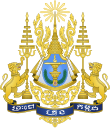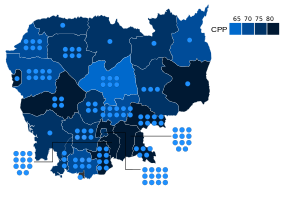
Samdech Hun Sen is a Cambodian politician, and former army general who currently serves as the president of the Senate. He previously served as the prime minister of Cambodia from 1985 to 1993 and from 1998 to 2023. Hun Sen is the longest-serving head of government in Cambodia's history. He is the president of the Cambodian People's Party (CPP), which has governed Cambodia since 1979, and has served as a member of the Senate since 2024. His full honorary title is Samdech Akka Moha Sena Padei Techo Hun Sen.

The National United Front for an Independent, Neutral, Peaceful and Cooperative Cambodia, commonly referred to as FUNCINPEC, is a royalist political party in Cambodia. Founded in 1981 by Norodom Sihanouk, it began as a resistance movement against the People's Republic of Kampuchea (PRK) government. In 1982, it formed a resistance pact with the Coalition Government of Democratic Kampuchea (CGDK), together with the Khmer People's National Liberation Front (KPNLF) and the Khmer Rouge. It became a political party in 1992.
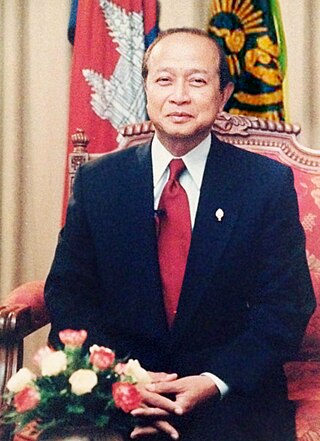
Norodom Ranariddh was a Cambodian politician and law academic. He was the second son of King Norodom Sihanouk of Cambodia and a half-brother of King Norodom Sihamoni. Ranariddh was the president of FUNCINPEC, a Cambodian royalist party. He was also the first Prime Minister of Cambodia following the restoration of the monarchy, serving between 1993 and 1997, and subsequently as the President of the National Assembly between 1998 and 2006.
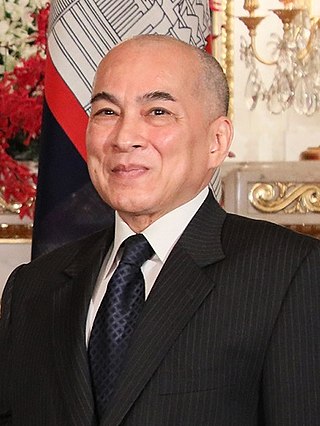
Norodom Sihamoni is King of Cambodia. He became King on 14 October 2004, a week after the abdication of his father, Norodom Sihanouk.
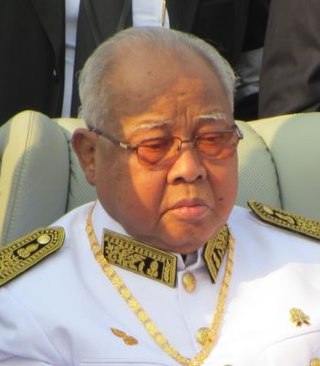
Chea Sim was a Cambodian politician. He was President of the Cambodian People's Party from 1991 to 2015, President of the National Assembly of Cambodia from 1981 to 1998 and President of the Senate from 1999 to 2015. His official title was Samdech Akka Moha Thamma Pothisal Chea Sim.

Sam Rainsy is a Cambodian activist, economist and former politician who most recently served as the Leader of the Opposition. He is now the interim leader of the Cambodia National Rescue Party due to the continued ban on political activity by the party's leader, Kem Sokha. Between 1998 and 2017, he was the leading opposition figure in Cambodian politics and the main challenger to prime minister Hun Sen and the Cambodian People's Party. Since 2015, he has lived in exile, having been banned from entering the country.

Sar Kheng is a Cambodian politician. He is the vice president of the ruling Cambodian People's Party and served as Minister of the Interior and deputy prime minister from 1992 to 2023. He also represents the province of Battambang in the Cambodian Parliament. Kheng has been the Minister of the Interior since 1992. Until March 2006, he shared the position with FUNCINPEC party member You Hockry as co-Ministers of the Interior, but then became sole interior minister in a cabinet reshuffle as FUNCINPEC ended its coalition with the CPP. He left office as interior minister in 2023 and was succeeded by his son, Sar Sokha.

Kem Sokha is a Cambodian former politician and activist who most recently served as the President of the Cambodia National Rescue Party (CNRP). He served as the Minority Leader, the highest-ranking opposition parliamentarian, of the National Assembly from December 2016 to January 2017, and previously as the First Vice President of the National Assembly from August 2014 to October 2015. He represented Kampong Cham as its Member of Parliament (MP) from 2008 to 2017. From 2007 to 2012, Kem was the leader of the Human Rights Party, which he founded.
Cambodia does not recognize same-sex marriage or civil unions, but recognizes a registry program known as the "declaration of family relationship" offering some limited legal rights to same-sex couples. By June 2021, this registry, which can serve as an evidence-based documentation of a relationship, had been introduced to 68 communes. Same-sex marriage has received support from King Norodom Sihamoni and his late father, King Norodom Sihanouk, who expressed support after witnessing same-sex marriages in San Francisco in 2004.

Mu Sochua is a Cambodian politician and rights activist. She was a Member of Parliament (MP) for Battambang from 2013 to 2017, a seat which she previously held from 1998 to 2003. She was a member and Vice President of the Cambodia National Rescue Party (CNRP) until its dissolution, and previously a member of the Sam Rainsy Party (SRP) prior to its merger with the Human Rights Party. As a member of FUNCINPEC, she also served as Minister of Women and Veterans' Affairs in Hun Sen's coalition government from 1998 to 2004. She is currently one of 118 senior opposition figures serving a five-year ban from politics following a court ruling on 16 November 2017.

The 1997 Cambodian coup d'état took place in Cambodia from July to September 1997. As a result, co-premier Hun Sen ousted the other co-premier Norodom Ranariddh. At least 32 people were killed during the coup.

General elections were held in Cambodia on 28 July 2013. The National Election Committee (NEC) announced that some 9.67 million Cambodians were eligible to cast their ballots to elect the 123-seat National Assembly. Voter turnout was reported to be 69.6%, a record low for a general election. Polling precincts opened 7:00 a.m. and closed at 3:00 p.m. The Cambodian Minister of Information, Khieu Kanharith announced in preliminary results that the Cambodian People's Party won 68 seats and the opposition Cambodia National Rescue Party won all the remaining 55 seats. This election marked the largest seat loss by the Cambodian People's Party to date, and their lowest share of seats since 1998.

The Cambodia National Rescue Party was a major political party in Cambodia. It was founded in 2012 as a merger between the Sam Rainsy Party and Human Rights Party.

Anti-government protests took place in Cambodia from July 2013 to July 2014. Popular demonstrations in Phnom Penh took place against the government of Prime Minister Hun Sen, triggered by widespread allegations of electoral fraud during the 2013 general election. Demands to raise the minimum wage to $160 a month and resentment at Vietnamese influence in Cambodia have also contributed to the protests. The main opposition party refused to participate in parliament after the elections, and major demonstrations took place throughout December 2013. A government crackdown in January 2014 led to the deaths of 4 people and the clearing of the main protest camp.

The Community of Royalist People's Party was a Cambodian political party that lasted from March 2014 until January 2015. It was founded and led by Norodom Ranariddh, who had been ousted from FUNCINPEC back in 2006. Ideologically a royalist party, the CRPP drew its inspiration from the political legacy of the former King of Cambodia, Norodom Sihanouk, and competed for its voter base with both FUNCINPEC and the Cambodia National Rescue Party (CNRP). In January 2015, the CRPP was dissolved when Ranariddh returned to FUNCINPEC.

The Minority Leader, or the Leader of the Opposition, leads the largest political party not in government in the National Assembly of Cambodia. The Minority Leader acts as a dialogue partner of the Prime Minister, and the Majority Leader. The official minority party must secure at least 25% of the total seats in Parliament.

Neth Savoeun is a deputy prime minister of Cambodia, serving under prime minister Hun Manet. He previously served as the National Police Chief from 2008 to 2023. Savoeun was promoted from Deputy National Police Chief to the most senior law enforcement position of the country in November 2008 after his predecessor, Hok Lundy, whose tenure was mired in controversy and accusations of corruption, died in a helicopter crash. Savoeun, who was 52 years old at the time of his appointment, is married to Prime Minister Hun Sen's niece, Hun Kimleng. Prior to the National Police force, Savoeun was the police chief of Phnom Penh during the State of Cambodia and then, after the 1993 elections, head of the justice department in the Interior Ministry’s Penal Crimes Division.
Senate elections were held in Cambodia on 25 February 2018 after being postponed from 14 January 2018. For the first time, the Senate and parliamentary elections occurred in the same year. The result was a victory for the CPP, which won all 58 seats. King Norodom Sihamoni nominated Princess Norodom Arunrasmy and Oum Somanin to the Senate.

Communal elections were held in Cambodia on 5 June 2022. It was the fifth quinquennial communal election in Cambodia since 2002. 1,652 communes in all 25 provinces of Cambodia were contested for a total of 11,622 commune council seats. The election precedes the 2023 general election and the 2024 Senate election. 9.2 million of 10.5 million eligible voters were registered to cast their ballots. Voter turnout was 80.3%.
Ky Tech is a Cambodian lawyer. He is currently the head of the Cambodian Government Lawyers Council and the lawyer for the Council of Ministers and Prime Minister Hun Sen.
